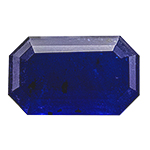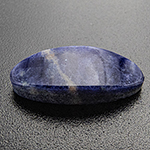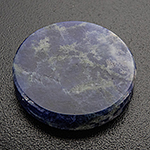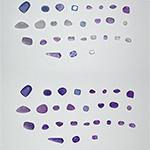Sodalite
Sodalite is a relatively common mineral of the "Silicates and Germanates" class.

Sodalite from the only source of facetable material known to us: Opuwo (formerlyOhopoho), Kunene, Namibia.
Origin of name: from Latin sodium and Greek λίθος (lithos) for stone in allusion to the high sodium content
Synonyms and trade names: very rarely one finds names like Alomite, Ditroite, Glaucolite and Canadian Lapis. The latter refers to important deposits discovered in 1891 in Ontario, Canada.
Can be confused with: blue sodalite can be confused with Lapis Lazuli. Light violettish blue sodalite can be confused with similarly coloured chalcedony or jade. Translucent sodalite can be confused with other blue gems like sapphire or cyanite but sodalite is easily identified via physical properties like refractive index and specific gravity.


Sodalite with typical inclusions of white calcite
Localities: Sodalite is found on all continents including Antarctica. As of June 2024 Mindat.org lists 623 localities.
Typlocality is the Llimaussaq complex in Narsaq District, Greenland, where sodalite was first discovered in 1811. First described in 1812 by Scottish chemist and mineralogist Thomas Thomson.
Handling: sodalite is very sensitiv to acids and heat. Eveb relatively weak hydrochloric acid leads to decoloration and subsequent disintegration. Hot water also triggers discoloration. Never clean ultrasonically!
Worth knowing: hackmanite, a white to purplish red variety of sodalite, named after Finnish geologist Victor Hackman, shows a phenomenon known as photochromism or tenebrescence. When exposed to strong light (e.g. sunlight), colours either become stronger (positive photochromism) or weaker (negative photochromism). In any case the process is reversible. When the light source is removed, the original colour returns.

Hackmanite before and after exposure to sunlight
Foto: Wikipedia
 Deutsch
Deutsch